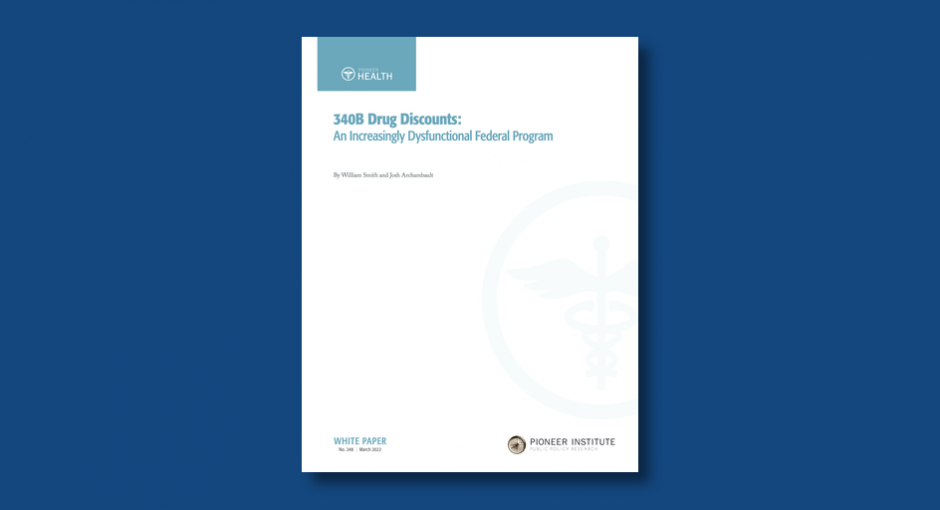Charity care has been declining significantly in some Massachusetts hospital systems, raising “a significant policy issue for the 340B program,” a free-market-oriented Massachusetts think tank whose donors include pharmaceutical manufacturers says in a new report.
The state hospital association said the report distorts the 340B program and ignores rising drug prices. It also said the report’s recommendations, if adopted, would harm safety-net hospitals to the benefit of manufacturers.
According to the Pioneer Institute, charity care among five Massachusetts hospital groups—Massachusetts General Hospital, UMass Memorial, Baystate Medical Center, Berkshire Medical Center, and Southcoast Hospitals—declined from 2013 to 2020, a time “it seems very likely that 340B sales to the five Massachusetts hospitals were growing.”
The report, “340B Drug Discounts: An Increasingly Dysfunctional Federal Program,” was released on March 22. One of its two authors, William Smith, is a former vice president of public affairs and policy at Pfizer and has been a consultant to major pharmaceutical, biotechnology, and medical device companies.
According to the Pioneer Institute’s latest annual report, its donors include drug companies Pfizer, Amgen, and GlaxoSmithKline. Two extremely influential financiers of conservative causes—the David H. Koch Trust and Adolph Coors Foundation—also are donors.
“In every hospital in our survey, the high-water mark for the provision of charity care to the community peaked in either 2013 or 2014,” the report said. It said Massachusetts General Hospital, the state’s largest hospital, “saw a decline in spending on charity care from 3.8 percent of patient revenues in 2013 to just 1 percent of patient revenues in 2020.”
Declines were less pronounced at two hospital groups that the study said “consistently provide the highest level of charity care in the state”—Boston Medical Center, and the Cambridge Health Alliance (which consists of Cambridge Hospital and Everett Hospital).
At Boston Medical Center, charity care as a percent of patient revenues rose from 10.8% in 2013 to 14% in 2016 and then fell to 7.4% in 2020, the study found.
At Cambridge Health Alliance, charity care fell from 15.4% in 2014 to 6% in 2017-18, then rose to 10.6% by 2019, the study said.
Nationally, “purchases through 340B rose from $9 billion in 2014 to $38 billion in 2020,” the study said. “It seems beyond doubt that Massachusetts hospitals would have secured a significant increase in revenue during this expansion of the 340B program. Why, then, did we not see a significant rise in the provision of charity care during this period?”
Report’s Recommendations
The Pioneer Insitutue report recommended that all states, not just Massachusetts, “Set a standard definition of charity care and 340B reporting, require annual reporting, and audit some reports submitted.” It also said states should “require hospitals to report on their revenue from 340B each year to see trends emerge and better inform state and federal policy.”
The study also made federal policy recommendations, including:
- require hospitals to report revenues from 340B programs
- require covered entities to spend all revenues from 340B programs on charity care and community programs
- define patients eligible for drug discounts and charity care programs
- disqualify child sites in wealthy areas from the 340B program
- standardize the definition of charity care and community programs
- reform disproportionate share hospital eligibility requirements for 340B programs
- convert 340B discounts to rebates.
Hospital Organization Criticizes Report
Hospital advocates argue that charity care does not provide an accurate reflection of a hospital’s commitment to low-income, uninsured, and under-insured patients. They argue that their uncompensated care levels, which remain high, are a better measuring stick. They also say that even though the number of the uninsured has dropped significantly both nationally and at the state level, the 340B program enables them to continue to provide critically important services including free and reduced-price medications, transportation and language services to name a few.
The Massachusetts Health & Hospital Association (MHA) said that “the report unfortunately distorts the merits of the program and wrongly interprets its purpose through a narrow lens, ignoring the most significant factor contributing to cost growth: pharmaceutical prices.”
“We fear that many of its recommendations would threaten safety net hospitals to the benefit of manufacturers,” MHA Vice President, Healthcare Finance & Policy Daniel McHale said. “We remain alarmed at the growing cost of prescription drugs throughout the United States, and fully support actions to target the sources of those costs and make medication more affordable for everyone in need.”
“As the patients and clinicians at the heart of our healthcare system can attest, the 340B program has been of tremendous benefit to Massachusetts,” McHale said. “The program has been essential in allowing providers to stretch limited resources to serve disenfranchised portions of the population.”


